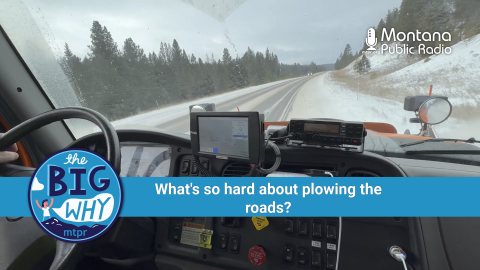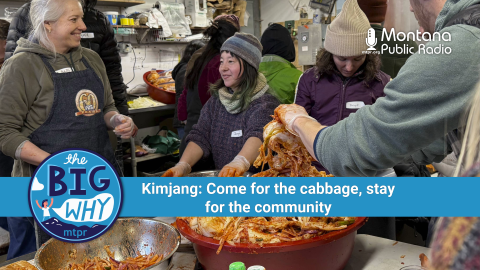This episode originally aired March 30, 2023.
Austin Amestoy: Welcome to the Big Why, a series from Montana Public Radio, where we find out what we can discover together. I'm your host, Austin Amestoy. This is a show about listener powered reporting. We'll answer questions large or small about anything under the Big Sky. By Montanans, for Montana, this is the Big Why.
This week, we’re tackling more of a “big where” than a why. A listener wants to know, where does our recycling go in Montana?
Joining me to get to the bottom of it is Montana Public Radio producer Nick Mott. Hey again, Nick!
Nick Mott: Hi Austin! Ooh, so recycling. I've got a big pile of cans and boxes and other stuff in my pantry that need some sorting this very moment.
Austin Amestoy: My place is pretty much the same way. I‘ve got a bunch of bags of recyclables sitting around my apartment just waiting for me to cram them in the car and take them away. But I've always wondered, what actually becomes of that stuff once I drop it off?
Nick Mott: Well, let’s find out. Where do we start?
Austin Amestoy: I figured I’d pay a visit to Republic Services’ Missoula collection facility to begin to answer that question.
Operations supervisor Sam Lubbers showed me around the facility, which serves about 3,600 residences in Missoula county. There were huge cubes of crushed aluminum and tin cans, shredded paper and plastic stacked around in a series of warehouses. And Lubbers told me that was a low-stock day. They’d just shipped out tons of material the week before.
Nick Mott: Tons?
Austin Amestoy: Yeah, quite literally tons. The facility’s general manager, Donald Moss, told me they process and ship about 6,000 tons of material every year. That’s something like a thousand dump truck loads of stuff that could otherwise end up in a landfill. And that gets at something that really surprised me. In Montana, not much of the actual recycling takes place here.
Nick Mott: Huh, so we collect it all, but then ship it somewhere else where it presumably gets turned into new stuff?
Austin Amestoy: Exactly. And, I learned that where our recycling goes largely depends on who’s buying. Lubbers gave me a few examples of where Missoula’s stuff goes, if you’re curious.
Nick Mott: Ooh, I’d love to know.
Austin Amestoy: Well, their tin usually heads to Butte before shipping to Kentucky, where it’s often melted down and turned into rebar. Their aluminum also ends up at a plant in Kentucky, most aluminum actually turns back into cans. Number one and two plastics often head to Sacramento or to British Columbia, Canada.
Nick Mott: So it sounds like keeping track of what actually happens to our recycling after it leaves the state can get really complicated, really fast. Is that right?
Austin Amestoy: Absolutely. But thankfully, Montana has — quite literally — one person in charge of keeping tabs on it all.
Dusti Johnson: I try to tell people, ‘please don’t forget about the cutting-edge things we have done in Montana. We’ve done things that other states are still talking about.’
Austin Amestoy: That’s Dusti Johnson. She’s a materials management specialist at the state Department of Environmental Quality. A big part of her job is roving the state and helping towns and cities establish and improve their recycling programs.
Nick Mott: It sounds like she has the answers we need!
Austin Amestoy: She does, a lot of them, anyway. Johnson’s been doing this for more than 30 years, but says the recycling business is always changing. I asked her for Montana’s recycling report card.
Dusti Johnson: Montana is recycling, and they do a very good job at recycling when the market is there.
Nick Mott: Oh, interesting. Did she have any numbers that could help us make sense of all this?
Austin Amestoy: She did. But to be fair, Johnson told me that it all comes down to educated guesswork. She said she has to rely on lots of data points like voluntary surveys at landfills and recycling centers, market demand, and more to guess how much of our waste gets recycled. With that in mind, she told me Montana recycles roughly 25% of what it throws away.
Nick Mott: That’s actually a pretty impressive figure.
Austin Amestoy: That’s what I thought, too. I did find one other study conducted in 2021 that estimated Montana’s recycling rate at 15%, but that report didn’t include cardboard or paper recycling and echoed Johnson in saying it didn’t have much data to go on.
But overall, Montana definitely lags behind national estimates for recycling. The Environmental Protection Agency reported more than 30% of waste was recycled in the U.S. in 2018.
Nick Mott: Hmm, interesting. So there are some obstacles keeping Montana from keeping pace nationally.
Austin Amestoy: No doubt. And Johnson had a lot to say about those challenges.
Dusti Johnson: Montana is a transportation state. Everything comes in, and everything goes out. We don’t manufacture anything here.
Austin Amestoy: In a big state like Montana, where relatively small communities are spread out from each other by hundreds of miles, in some cases, those transportation costs add up quickly. Johnson says Montana companies have to bale and ship plastic, tin, aluminum and other materials all over the country and world: Utah, Oregon, Washington, Southeast Asia.
Nick Mott: Yeah, I can see how that would make recycling difficult.

Austin Amestoy: Exactly. Johnson says the recycling industry operates on supply and demand, just like any other business.
And the demand for recycled material can fluctuate based on all kinds of things like demand for cardboard surges around the holidays as shipping picks up and plastics are on the rise as big bottling companies work to include more recycled material in their products. But other materials, glass in particular, are much less valuable in their unrecycled form, making it difficult for companies to turn a profit collecting it.
Nick Mott: Wow, what a headache! I have to imagine some parts of the state are finding some creative solutions.
Austin Amestoy: That’s right. Lots of communities in Montana are experimenting with ways to make recycling work right where they are. One really cool example Johnson gave was a program in Ekalaka that collects plastic water bottles and melts them down into a filament. Then the town uses 3D printers to form the plastic into souvenir dinosaur toys for its museum gift shop.
Another example is a program in Missoula that’s figured out a way around that glass issue I just mentioned. That particular material has basically no market value in its scrap form.
On a small pad of pavement near the city’s wastewater treatment plant, the folks at nonprofit Recycling Works are regularly picking up and smashing glass with a CAT loader. There was a small mountain of the stuff the day I visited.
Recycling Works was born as a program of the Missoula Interfaith Collaborative, a coalition of churches, businesses and other organizations seeking to do some good in the community.
Ted Geilen: We kind of wanted to do glass because it was hard.
Austin Amestoy: That’s Ted Geilen, the program’s executive director. Recycling Works provides western Montana’s only curbside glass recycling service. Members can pay to have their glass bottles picked up once a month, and after that, Recycling Works crushes them up, bags them and ships them to a processing facility in Salt Lake City, Utah.

Nick Mott: So, how did they get around the market value problem?
Austin Amestoy: Well, Geilen told me it’s a challenge that never really goes away. He said the organization has some excellent donors and lots of buy-in from the community, which helps. They also send their glass to Utah on trucks that would be heading that way empty anyway. But, at one point, Geilen said the nonprofit was losing thousands of dollars each month. He loaned $20,000 of his own money to help save it.
Nick Mott: Oh my gosh. But they were able to figure things out?
Austin Amestoy: I’ll let Geilen tell us himself.
Ted Geilen: We did. The number of people who came out from the community to sign up was extraordinary, and we continue to grow rapidly.
Austin Amestoy: So, what my trips to Recycling Works and Republic Services and my conversation with Dusti Johnson showed me is that Montana really does make a good effort to recycle. But what happens next, as in, where that recycling goes, is largely out of our control and driven by a market that fluctuates all the time.
Nick Mott: You know, I’ve heard horror stories of how little of what we recycle actually gets recycled. But this leaves me feeling a little bit optimistic. Do you have any parting wisdom for our listeners?
Austin: That’s a great point. There have been some really wild market fluctuations in recent years that really shook up the industry. But my main takeaway is that there are still actions we can take as individuals to make sure your recycling goes where it’s supposed to. Before you recycle anything, check to see what’s accepted in your city. Be diligent in separating your plastics by number, and clean and dry everything before dropping it off. Doing those simple tasks goes a long way to ensuring your waste is properly recycled. And, I’ll let recycling expert Johnson have the final word.
Dusti Johnson: I believe in recycling. I wouldn’t be doing this job for as long as I have. It’s the right thing to do, as long as you're doing the right thing.
Nick Mott: Well, thanks for breaking it all down for us, Austin.
Austin Amestoy: My pleasure Nick. And if you want to listen to a more lengthy interview with Dusti Johnson, check it out below. It’s worth it, trust me.
Now we want to know what makes you curious about Montana. This show is all about answering your questions, big or small, so ask your question below. Find us wherever you listen to podcasts.
-
Elk are a familiar sight in much of Montana now, but that hasn't always been the case. By the early 1900s, unregulated hunting had led to massive declines in wildlife nationwide. But In Yellowstone, elk populations were exploding thanks to protections in place there. The solution to restoring elk outside the park seemed obvious. Less obvious was how to make it happen. This week on the Big Why, we trace the animals' bumpy path from the living laboratory called Yellowstone Park to the Bitterroot Valley and beyond.
-
If you’ve been to a taproom, you know that at most breweries across the state there’s a three pint limit and they stop serving at 8 p.m. One listener wants to know why. We've got answers. Pull up a stool, crack open a local brew and settle in for a taproom tale – or some barroom banter, depending on the time of day.
-
When it comes to winter driving, everyone wants their route clear and dry, and they want it done quickly. Why don't the plows come sooner or more often? Why don't they drop more salt or deicer? Why not get more drivers on the road? Tag along as a Montana snowplow driver prepares for a big winter storm and find out more about the logistical, environmental and technical challenges that come with keeping the roads clear of snow.
-
How do cabbage and spices become ingredients for community building? In Korea, the answer is kimjang, the fall tradition of making and sharing kimchi. This week on The Big Why, we visit a farm in the Bitterroot Valley where a group of Montanans came together to keep a food custom alive and find comfort and connection among the cabbage.








